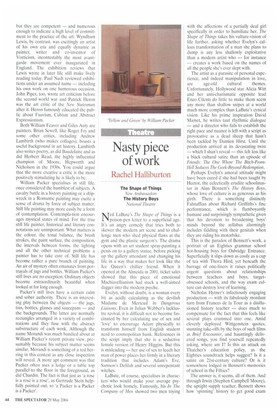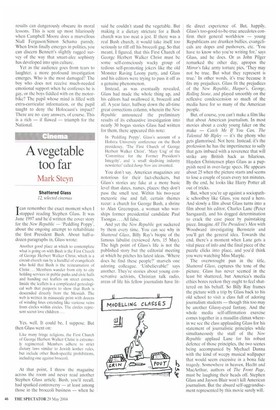Nasty piece of work
Rachel Halliburton
The Shape of Things New Ambassadors The History Boys National Theatre
Neil LaBute's The Shape of Things is a poison-pen letter to a superficial age. It's an angry comedy that tries both to skewer the modern art scene and to challenge men who shed physical flaws at the gym and the plastic surgeon's. The drama opens with an art student spray-painting a penis on to a gallery statue, before picking up the gallery attendant and changing his life in a way that makes her look like the Ice Queen's chillier friend. When it opened at the Almeida in 2001, ticket sales showed that this piece of emotional Machiavellianism had stuck a well-aimed dagger into the modern psyche.
Evelyn, without doubt, is a woman every bit as acidly calculating as the devilish Madame de Merteuil in Dangerous Liaisons. Even in Julian Webber's lacklustre revival, it is difficult not to become fascinated by her calculating use of sex and 'love' to encourage Adam physically to transform himself from English student nerd to cosmopolitan hunk. References in the script imply that she is a seductive female version of Henry Higgins. But this is misleading — her use of sex to leech her man of power places her firmly in a literary tradition that includes Adam's Eve, Samson's Delilah and several unrepentant witches.
LaBute, of course, specialises in characters who would make your average psychotic look homely. Famously, his In The Company of Men showed two men toying with the affections of a partially deaf girl specifically in order to humiliate her. The Shape of Things takes his vulture-vision of life further, asking whether Evelyn's callous transformation of a man she plans to dump is any less shallowly exploitative than a modern artist who — for instance — creates a work based on the names of all the people she's ever slept with.
The artist as a parasite of personal experience, and indeed manipulation in love, are age-old cultural themes. Unfortunately, Hollywood star Alicia Witt and her anti-charismatic opposite lead Enzo Cilenti do little to make them seem any more than shallow snipes at a world much more complex than LaBute's cynical vision. Like his prime inspiration David Mamet, he writes taut rhythmic dialogue — and a director who fails to establish the right pace and nuance is left with a script as provocative as a dead sheep that hasn't been tackled by Damien Hirst. Until the production arrived at its devastating twist — which I shan't reveal — this felt less like a black cultural satire than an episode of Friends: The One Where The Bitch-FromHell Seduces The Geek-Beyond-Redemption.
Perhaps Evelyn's amoral attitude might have been cured if she had been taught by Hector, the eclectically erudite schoolmaster in Alan Bennett's The History Boys, whose love of culture is as generous as his girth. There is something distinctly Falstaffian about Richard Griffiths's fine performance, which is flamboyantly humane and surprisingly sympathetic given that his devotion to broadening boys' minds beyond the syllabus alarmingly includes fiddling with their genitals when they are riding his motorbike.
This is the paradox of Bennett's work, a portrait of an Eighties grammar school hot-housing boys for Oxbridge Entrance. Superficially it slips down as cosily as a cup of tea with Thora Hird, yet beneath the barrage of one-liners it raises politically urgent questions about relationships between teachers and boys, targetobsessed schools, and the way exam culture can destroy love of learning.
Nicholas Hytner's infectiously engaging production — with its fabulously mordant turn from Frances de la Tour as a disillusioned history teacher — does much to compensate for the fact that this feels like several plays crammed into one. Amid cleverly deployed Wittgenstein quotes, stunning take-offs by the boys of such films as Brief Encounter, and hauntingly delivered songs, you find yourself repeatedly asking, where am I? Is this an attack on Thatcher's education policy, as the Eighties soundtrack helps suggest? Is it a satire on 21st-century culture? Or is it somewhere lodged in Bennett's memories of school in the Fifties?
The answer is, it seems, all of them. And through Irwin (Stephen Campbell Moore), the uptight supply teacher, Bennett shows how 'spinning' history to get good exam results can dangerously obscure its moral lessons. This is sent up most hilariously when Campbell Moore does a marvellous Niall Ferguson/Simon Schama parody. When Irwin finally emerges in politics, you can discern Bennett's slightly ragged survey of the way that smart-alec sophistry has developed into spin culture.
Yet as the audience goes from tears to laughter, a more profound investigation emerges. Who is the most damaged? The boy who does not receive much-needed emotional support when he confesses he is gay, or the boys fiddled with on the motorbike? The pupil whose mind is filled with extra-curricular information, or the pupil taught to deny the Holocaust's impact? There are no easy answers, of course. This is a rich — if flawed — triumph for the National.



































































 Previous page
Previous page